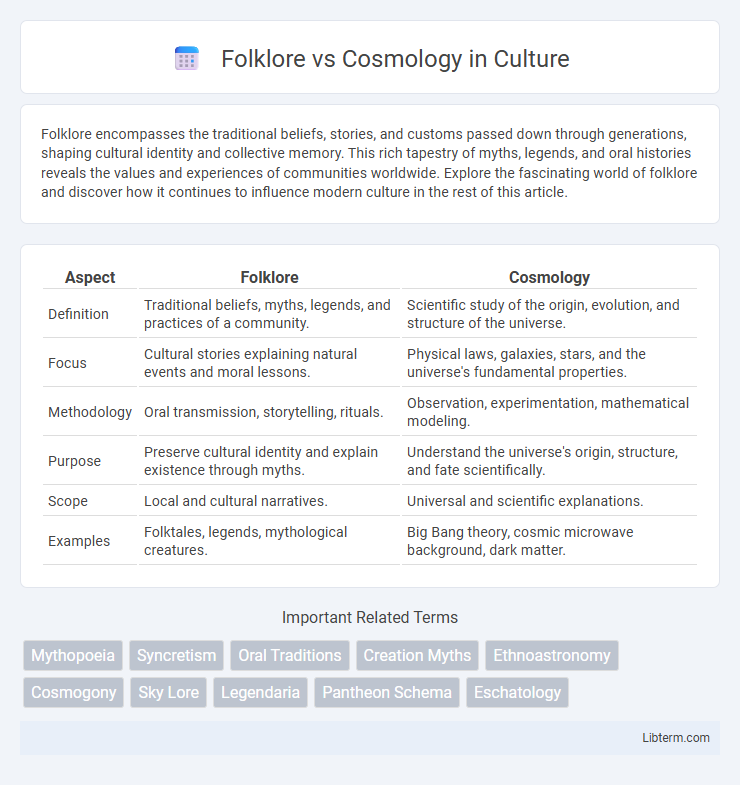Folklore encompasses the traditional beliefs, stories, and customs passed down through generations, shaping cultural identity and collective memory. This rich tapestry of myths, legends, and oral histories reveals the values and experiences of communities worldwide. Explore the fascinating world of folklore and discover how it continues to influence modern culture in the rest of this article.
Table of Comparison
| Aspect | Folklore | Cosmology |
|---|---|---|
| Definition | Traditional beliefs, myths, legends, and practices of a community. | Scientific study of the origin, evolution, and structure of the universe. |
| Focus | Cultural stories explaining natural events and moral lessons. | Physical laws, galaxies, stars, and the universe's fundamental properties. |
| Methodology | Oral transmission, storytelling, rituals. | Observation, experimentation, mathematical modeling. |
| Purpose | Preserve cultural identity and explain existence through myths. | Understand the universe's origin, structure, and fate scientifically. |
| Scope | Local and cultural narratives. | Universal and scientific explanations. |
| Examples | Folktales, legends, mythological creatures. | Big Bang theory, cosmic microwave background, dark matter. |
Understanding Folklore: Traditions and Tales
Folklore encompasses traditional stories, customs, and beliefs passed down through generations, often reflecting cultural values and social norms within communities. Unlike cosmology, which seeks to explain the universe's origin and structure through scientific or philosophical frameworks, folklore uses narrative and symbolism to preserve collective memory and identity. Understanding folklore involves examining myths, legends, and rituals that reveal how societies interpret their environment and human experience.
Defining Cosmology: The Science of the Universe
Cosmology is the scientific study of the universe's origin, structure, evolution, and eventual fate, relying on empirical evidence and mathematical models. Unlike folklore, which consists of traditional beliefs and stories explaining natural phenomena through cultural narratives, cosmology uses tools such as astrophysics, astronomy, and general relativity to formulate testable theories. Modern cosmology explores concepts like the Big Bang, dark matter, dark energy, and cosmic inflation to understand the universe's vast complexity and fundamental laws.
Folklore's Cosmological Narratives
Folklore's cosmological narratives embody traditional stories that explain the origins, structure, and functioning of the universe through mythic symbolism and cultural beliefs. These narratives serve to articulate community values, natural phenomena, and existential questions, often intertwining deities, creation myths, and ancestral spirits. By preserving collective memory and worldview, folklore cosmologies provide a foundational framework distinct from empirical cosmology, reflecting the sociocultural context of a group.
Origins: Mythic Creation Stories vs. Scientific Theories
Mythic creation stories in folklore often explain the origins of the universe through symbolic narratives involving gods, supernatural beings, and cosmic events central to cultural identity. Scientific cosmology relies on empirical evidence and theories such as the Big Bang, cosmic inflation, and the formation of galaxies to describe the universe's inception and evolution. These contrasting approaches highlight folklore's role in shaping cultural worldview and cosmology's focus on observable phenomena and measurable data.
Symbolism and Archetypes in Folklore and Cosmology
Symbolism and archetypes play a central role in both folklore and cosmology, serving as foundational elements that convey complex ideas through universally recognizable motifs. In folklore, archetypal characters such as the hero, trickster, and wise old man represent human qualities and moral lessons, while symbolic objects like the tree of life or the serpent embody themes of growth, renewal, and transformation. Cosmology employs similar symbols and archetypes to explain the origin and structure of the universe, using celestial bodies and mythic figures to represent cosmic principles and the interconnectedness of existence.
Evolution of Worldviews: From Myths to Modern Science
Folklore and cosmology represent distinct approaches to understanding the universe, where folklore relies on mythological narratives to explain natural phenomena, while cosmology employs scientific principles and empirical evidence. The evolution of worldviews traces a transition from myth-based explanations rooted in cultural traditions to modern science's systematic exploration of cosmic origins and laws. This shift reflects humanity's growing reliance on observation, experimentation, and critical reasoning to decipher the cosmos beyond allegorical storytelling.
Cultural Significance of Stars and Celestial Bodies
Folklore and cosmology both emphasize the cultural significance of stars and celestial bodies by interpreting them through mythological narratives and scientific frameworks, respectively. Folklore often attributes symbolic meanings, moral lessons, and ancestral heritage to stars, weaving them into stories that shape community identity and traditions. Cosmology provides an empirical understanding of celestial phenomena, yet both fields converge in their role of connecting human culture with the cosmos, highlighting the universal quest for meaning in the night sky.
The Influence of Folklore on Early Cosmological Thought
Folklore significantly shaped early cosmological ideas by embedding natural phenomena within mythological narratives that explained the origins and structure of the universe. Traditional stories about creation, celestial bodies, and natural events provided frameworks that predated formal scientific inquiry and influenced early astronomers' interpretations of the cosmos. These mythic interpretations often guided early cosmological models by blending cultural beliefs with observations of the sky, thus laying foundational concepts for later scientific exploration.
Folklore and Cosmology in Contemporary Society
Folklore in contemporary society preserves cultural identity by transmitting traditional narratives, rituals, and customs that connect communities to their historical roots. Cosmology, as the scientific and philosophical study of the universe's origin and structure, shapes modern worldviews and influences technological and ethical advancements. The interplay between folklore and cosmology highlights how ancient beliefs coexist and evolve alongside contemporary scientific understanding, enriching cultural diversity and fostering a holistic perception of existence.
Bridging the Gap: Integrating Tradition and Science
Folklore embodies traditional narratives and cultural beliefs that explain natural phenomena through myth and storytelling, while cosmology employs scientific methods to understand the universe's origins and structure. Bridging the gap between folklore and cosmology involves integrating ancient wisdom with modern astrophysical discoveries to enrich cultural perspectives and promote scientific literacy. This synthesis fosters a holistic worldview that respects both the symbolic meaning in folklore and empirical evidence in cosmology.
Folklore Infographic

 libterm.com
libterm.com